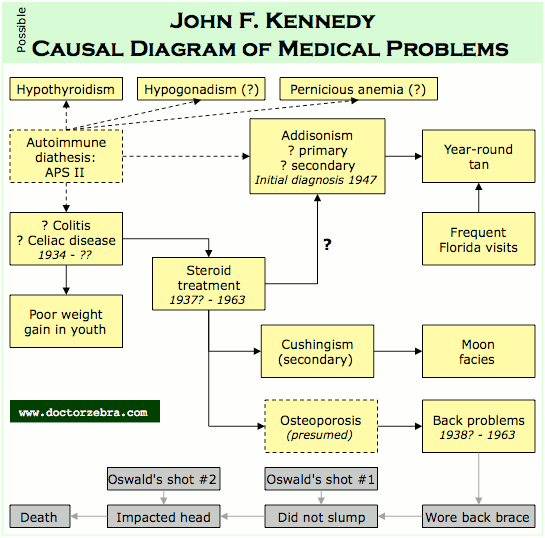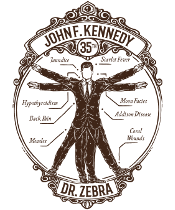

Health and Medical History of President
John KennedyLived 1917-1963
Health and Medical History of President
John KennedyLived 1917-1963
1776-1783
1812-1815
1846-1848
1861-1865
1898-1899
1917-1918
1941-1945
1950-1953
1964-1975
1990-1991
2001-2021

| UNDER CONSTRUCTION |
Bumgarner provides an excellent short recap of Kennedy's medical history 2a, although the new medical sources pioneered by Dallek 1 3 are leaving it behind.
Dr. Lee Mandel 4 has recently offered a unifying medical diagnosis for Kennedy: auto-immune polyendocrine syndrome type II (APS II).
Dr. Mandel notes that Kennedy had signs of adrenal failure as early as 1940, and that his autopsy almost certainly indicates this was auto-immune in origin. Kennedy was diagnosed with hypothyroidism in 1955 and was under treatment for years (see below). 4 Comment: [Technical] APS II is a polygenic disorder defined as: (a) auto-immune adrenocortical failure plus (b) evidence of adrenal inflammation plus (c) either auto-immune thyroid disease or type 1 diabetes mellitus. The peak age of onset is 30. (JFK was 30 when his adrenal insufficiency was diagnosed.) Other associated autoimmune disorders include: atrophic gastritis (with or without pernicious anemia), hypergonadotrophic hypogonadism, and celiac disease.
The diagram below summarizes the possible interplay between Kennedy's medical problems. The rest of this page has details.

- Between 1920 and 1928 a Dr. Reardon "took care of ear."
- 1928: German measles
- June 15, 1930: "Examined by Lahey Clinic, tonsils and adenoids OK"
- Aug. 31, 1933: "Tonsils and adenoids out -- Dr. Kahill, St. Margaret's Hospital"
From age 20 to age 43, available data show that Kennedy's weight was more or less constant -- about 155-160 pounds 4, (corresponding to a body mass index of about 21-22 kg/m/m). Between July 1960 and January 1961, however, he gained 15-20 pounds, causing his mother to remark to her diary on Nov. 3, 1960: "Jack looks unusually well. His cheeks have filled out amazingly since I saw him in June. He has lost that lean Lincolnesque look which I secretly like better" 4.
The problem with Travell's recollection is that Kennedy was hospitalized the same day she met him, and the hospital records neither say Kennedy was anemic nor list anemia as a diagnosis 4. Thus, Travell's memory may be inaccurate. Comment: It would not be surprising if Kennedy had pernicious anemia, as it may be part of the APS II syndrome.
In both 1935 and 1939, Kennedy's basal metabolic rate was -11, which Dr. Walter Alvarez regarded as "well within normal limits" 4.
The reason(s) he took this medication are unknown. Certainly, his body was not completely devoid of testosterone, as he fathered four children from 1956 to 1960. It is possible that his testosterone level was reduced by the cortico-steroids he chronically took, or as a consequence of APS II (see above) 4. It has been written that Kennedy took testosterone to keep his weight up 4a. This may be true, as he gained 15-20 pounds between July 1960 and January 1961 4.
Dallek believes steroids were the "principal contributor" to Kennedy's duodenal ulcer (see above) and back problems (see below) 3d. (Steroids cause thinning of bones.) Steroids also altered the shape of Kennedy's face (see below) and, perhaps, body.
Another complication of steroid use is suppression of adrenal gland function. Kennedy was diagnosed with underactive adrenal glands in 1947, a condition known as Addison disease (see below). If Dallek is correct, Kennedy had by then been on steroids for 10 years, although not continuously 3. This makes it extremely difficult to know if Kennedy's Addison disease was the result of chronic steroid use, or whether it was the result of some other process (e.g. auto-immunity).
In January 1956 he underwent cystoscopy under anesthesia 3h. Comment: Was this a sexually transmitted disease? (1) The response to sulfa suggests it was infectious. (2) Kennedy had a large number of sexual contacts before he was even out of college, and (3) it seems unlikely he practiced safe sex 3i. As one female acquaintance remarked, "He was not much for planning ahead" 3j.
He wore a back brace. For example, on the day he was shot, he wore a brace that consisted of a canvas brace with metal stays, together with an Ace bandage with extra padding 7a. Some people think this back brace killed him. (See below.)
Kennedy took 10 days to recover from "symptoms of fatigue and many deep abrasions and lacerations of the entire body, especially the feet" 3k.
Dallek reports that "Doctors who treated Jack's Addison's or read closely about his condition have concluded that he had a secondary form of the disease, or a 'slow atrophy of of the adrenal glands,' rather than a rapid primary destruction" 3o. Dallek is hinting that Kennedy's Addisonism was due to chronic use of steroids, but he does not take a stand.
While a U.S. Senator, Kennedy underwent major surgery on his back even though the effects of Addison disease on the tolerance of surgery was largely unknown at the time. 10. In fact, JFK's case was published in the medical literature in 1955, although this was not publicly realized until 1967 7b. Post-operatively, he developed a urinary tract infection and had a transfusion reaction, characterized by "mild angioneurotic edema." He also had a repeat operation four months later 10.
Comment: Steroids classically cause a facial appearance known as "moon facies." This refers to the round shape the face assumes. Dr. Zebra always checks for moon facies by looking at the outer corner of the eye sockets. If there is facial tissue behind the eyes that projects laterally from the bony outer border of the orbit, then some degree of moon facies are present. Several photographs of Kennedy have this appearance.
To be sure, Addisonism may not be the whole story. Even in youth, Kennedy liked having a tan, saying "It gives me confidence. ... It makes me feel strong, healthy, attractive" 3q.
Kennedy was taking testosterone in 1963 4, and this could have had an (enhancing) effect on his libido. It is not clear when Smathers' statement was made and whether Kennedy was then taking testosterone.
| cortisone | [injected] Cortisol has profound psychological effects. At one extreme, "steroid psychosis" can result. At the other, a profound sensation of well-being can occur. In between, the effects are more difficult to characterize. |
| cortisone | [oral] |
| lomotil | For diarrhea. Contains anti-cholinergic compounds, which, in toxic doses, can make someone "mad as a hatter." |
| paregoric | For diarrhea. Contains opium. Mentation is probably unaffected if used in reasonable doses, but Kenndey was taking at least 3 medications for diarrhea, suggesting that doses were high. |
| phenobarbital | A classic "downer" |
| testosterone | Was Kennedy's "bull-like" libido a side effect of testosterone? Was his cholesterol level of 410? |
| trasentine | An anti-diarrhea medication. There is very little published about this drug. Side effects include giddiness and euphoria. |
| Tuinal | A mixture of secobarbital and amobarbital Kennedy used to help him sleep. Amobarbital is better known as Amytal, one of the more common "truth serum" drugs. |
| amphetamines | Post and Robins, writing in 1993, thought it was "highly suggestive" that Kennedy took amphetamines while President, but considered it unproven 13a. The recent Atlantic article states definitively that Kennedy received injections of amphetamines and painkillers from "Dr. Feelgood," a.k.a. Max Jacobson 1b. Kennedy dismissed concerns about the injections, saying, "I don't care if it's horse piss. It works." Jacobson's medical license was revoked in 1975. Previously, in 1969, all controlled substances in his possession were confiscated by the Bureau of Narcotics and Dangerous Drugs 13a. It is thought that Kennedy was under the influence of amphetamines when he made his "Ich bin ein Berliner" speech 13a. |
To put things in a different light, if an officer in the U.S. Air Force were taking any one of these medications, he or she would not even be allowed to talk on the radio to aircraft as supervisor of flying. Kennedy, as commander-in-chief, was supervisor for the entire Air Force.
Question: Did the Bay of Pigs result from Kennedy talking, or was it the testosterone talking? MORE
Some think that Kennedy's back brace killed him 7a 1. It kept him erect after Oswald's first bullet went through his neck. Had he been able to fall forward after this first bullet hit, the second, fatal bullet may have missed him.
- On the ocean liner Queen Mary in September 1947, bringing him home from London where he had received the diagnosis of Addison disease and been hospitalized 3t.
- When a post-operative urinary tract infection in October 1954 put Kennedy into a coma 3u.
- Before he was officially pronounced dead on Nov. 22, 1963 -- administered by a Fr. Huber. 15.
- JFK had scarlet fever, diphtheria, and whooping cough as a child. At age 14 he weighed 95 pounds. 16a
- JFK had allergies, poor hearing, a sensitive stomach, and an old knee injury that occasionally caused him to limp. 16b
- On school entrance exams in 1931, Kennedy scored 119 on an IQ test 3v.
- Commenting on Kennedy's temperament, a White House speechwriter observed: "there was an inner hardness, often volatile anger, beneath the outwardly amiable, thoughtful, carefully controlled demeanor of John Kennedy" 3w. Kennedy described himself as "always on the edge of irritability" as President. 3x.
- JFK's sister, Eunice Kennedy Shriver, had Addison disease 3y 16c. His son, John F. Kennedy Jr., had Graves disease 4.
- Another sister, Rosemary, was retarded from the time of her birth during the 1918 influenza pandemic 3z. However, the cause of her condition was (and remains) unknown. At age 21 she became violent and underwent a pre-frontal lobotomy that "proved to be a disaster." She spent the rest of her life in an institution 3aa.
- McKusick cites Jacqueline Kennedy Onassis as exemplar of telecanthus (increased separation of the medial canthi without abnormal separation of the orbits). OMIM 187350
- JFK's history number at Parkland was 24740. Governor John Connally was #24743. 17a
- The first physician to see Kennedy at Parkland had delivered Oswald's baby one month before. 17a
- Kennedy's mother was the product of a consanguineous union between second cousins. This clearly did not affect her longevity! 3ab
- Where are his adrenals now? NIH?
- Dallek, Robert. The medical ordeals of JFK. Atlantic Monthly. 2002 (Dec);290(5):49-61.
a p.61 b p.60
- Bumgarner, John R. The Health of the Presidents: The 41 United States Presidents Through 1993 from a Physician's Point of View. Jefferson, NC: MacFarland & Company, 1994.
 a pp.234-249 b p.234, 235 c pp.234, 235 d p.234 e p.235 f pp.240-241 g p.243
a pp.234-249 b p.234, 235 c pp.234, 235 d p.234 e p.235 f pp.240-241 g p.243Comment: Devotes one chapter to each President, through Clinton. Written for the layperson, well-referenced, with areas of speculation clearly identified, Dr. Zebra depends heavily on this book. Dr. Bumgarner survived the Bataan Death March and has written an unforgettable book casting a physician's eye on that experience.
- Dallek, Robert. An Unfinished Life: John F. Kennedy 1917-1963. Boston: Little, Brown, 2003.
- Mandel LR. Endocrine and autoimmune aspects of the health history of John F. Kennedy. Annals of Internal Medicine. 2009; 151: 350-354.
a citing Dallek and Kelleman
Comment: Available on the web at: http://annals.org/cgi/content/full/151/5/350
- Marion, Robert. Was George Washington Really the Father of our Country?. Reading, MA: Addison-Wesley, 1994.
 a p.174 b p.175 c pp.177-178
a p.174 b p.175 c pp.177-178 - Travell, Janet. Office Hours: Day and Night. Cleveland, OH: New American Library, 1968.
a p.5
Comment: Travell was one of Kennedy's physicians during his Presidency. Although all autobiographies are inherently narcissistic, the level in this one is tough to stomach -- almost as bad as Jerry Linenger's, in fact.
- Cooper, Pauline. The Medical Detectives. New York: David McKay, 1973.
 a p.198 b p.209
a p.198 b p.209 - Boller, Paul F. Jr. Presidential Anecdotes. New York: Oxford University Press, 1981.
 a p.300
a p.300 - Beschloss, Michael. [Interview]. PBS NewsHour with Jim Lehrer. KQED-TV, San Francisco, 21 January 2005. The interview was about an exhibition at the National Archives of photographs of Presidents in casual situations..
Comment: Web site for the interview, including a picture: http://www.pbs.org/newshour/bb/media/jan-june05/exhibit_01-21.html
- Nicholas JA, Burstein CL, Umberger CJ, Wilson PD. Management of adrenocortical insufficiency during surgery. Archives of Surgery. 1955;71:737-742.
Comment: JFK is case 3
- O'Leary C, Walsh CH, Wieneke P, O'Regan P, Buckley B, O'Halloran DJ, Ferriss JB, Quigley EM, Annis P, Shanahan F, Cronin CC. Coeliac disease and autoimmune Addison's disease: a clinical pitfall. QJM. 2002 Feb;95(2):79-82. Pubmed: 11861954.
- Summers, Anthony; Dorril, Stephen. Honeytrap: The Secret Worlds of Stephen Ward. London: Weidenfeld & Nicolson (91 Clapham High St. SW4 7TA), 1987.
a (plate caption) b p.69
Comment: Much sensationalism and drivel has been written about JFK. Thus, it is very hard for anyone devoting less than full time to Kennedy studies to discern what is credible and what is not. This book strikes me as containing a mixture of credible, verifiable statements and statements best treated with skepticism.
- Post, Jerrold M. and Robins, Robert S. When Illness Strikes the Leader: The Dilemma of the Captive King. New Haven, CT: Yale University Press, 1993.
 a pp.69-70
a pp.69-70Comment: At one time Post worked for the CIA, profiling foreign leaders.
- Lattimer JK, et al. An experimental study of the backward movement of President Kennedy's head. Surg Gynecol Obstet. 1976 Feb;142(2):246-54. Pubmed: 1108248.
- Cronkite, Walter. [Broadcasting the death of President Kennedy on Nov. 22, 1963]. Available on the web: http://www.youtube.com/watch?v=2K8Q3cqGs7I
Comment: Sarah Burgess wrote me about this on 2010-05-02, but when I checked on 2016-10-11, the video had been taken down. The disclosure was reportedly made at the 3 minute, 16 second mark in the video.
- MacMahon, Edward B. and Curry, Leonard. Medical Cover-Ups in the White House. Washington, DC: Farragut, 1987.
 a p.121 b p.120 c p.133
a p.121 b p.120 c p.133 - Crenshaw, Charles A.; Hansen, Jens; Shaw, J. Gray. JFK: Conspiracy of Silence. New York: Signet, 1992.
 a p.74
a p.74Comment: This book has been roundly criticized by other physicians involved in the Kennedy case.







